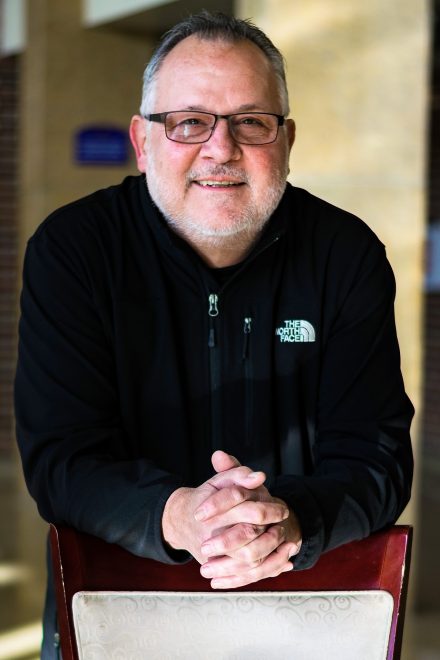(Published Spring 2018)
Dale Haefner is no stranger to the challenges of putting on a concert. As the director of the University’s Music Performance series, he’s brought scores of national and international musicians to town for more than 20 years. An accomplished musician himself, Haefner is detail-oriented, well-organized and finds the more one prepares, the smoother things tend to go.

Dale Haefner
Even when working with artists from Somalia as part of the Midnimo grant project, Haefner was able to coordinate all of the residency details on the University campus. Until new U.S. travel policies came into play, that is. The proposed travel ban derailed plans for visiting artists in 2017 and threatened to disrupt yet another music residency at the University this spring.
So Haefner decided to go rogue. He also decided to go big.
The result is that Mankato was the setting for a blast of Somali art and culture in early April by way of Somali artists, writers, actors, playwrights and filmmakers.
“Waiting and seeing wasn’t working,” Haefner said.
When the bottom drops out
In 2016, the Music Performance Series, founded by Haefner more than 20 years ago, joined a three-year initiative to bring International Somali Muslim musicians to campus for musical residencies. Funded by the D
oris Duke Charitable Foundation and the Doris Duke Foundation for Islamic Art.
Both foundations partner with the Association of Performing Arts Professionals to support projects that demonstrate the power of the arts to increase intercultural understanding. The project involves Minnesota State Mankato as well as two other institutions in Minnesota–The Cedar Cultural Center and The Paramount Center for the Arts in St. Cloud.
As the lead organization, the Cedar Cultural Center determines the artists and works with the other groups to schedule performances and

Ifrah Mansour
residencies. Last spring, they scheduled musician Cali Dhaanto. He’s unique among Somali artists for his ability to engage several generations by bridging Somali traditions with contemporary sounds.
“We found out eight weeks before he was supposed to appear in Mankato that he wasn’t coming,” Haefner said.
Dhaanto’s work visa was denied, a casualty of President Donald Trump’s executive order barring citizens of eight countries, including Somalia, from entering the United States.
Haefner cancelled events surrounding the visit and awaited word from the Cedar.
In quick turnaround time, the Cedar secured a fantastic Somali act, singer Nimco Yasin, who in April 2017 spent a week in several music and non-music classes at Minnesota State Mankato, visited local elementary schools, talked about women and culture at an interfaith center and gave a concert at South Central College.
A second residency was planned for the fall: Somali singer Aar Maanta and the Urban Nomads. Named a goodwill ambassador for the United Nations Refugee Council, Maanta had been living and working in England when tapped to perform in the series.
Maanta’s band, the Urban Nomads, were approved–but Maanta’s visa was withheld too long. The residency and related events throughout Minnesota were dropped.
“It’s called additional administrative processing,” Haefner said. Maanta’s application was eventually cleared, but it was too late for the University’s calendar. “When we apply for these visas we have to tell the Immigration Department the beginning date and the end date. They approved his visa after the end date.”
Plan B
In 2018, the Cedar began working on bringing Maanta back into the country for
a series of concerts. A new visa application was submitted, but in early March, Haefner said, the visa status was “in administrative processing hell.”
As he waited on word of Maanta’s status, Haefner decided he wasn’t going to simply hope for the best and risk canceling everything again.
He decided to act on his own and began inquiring about other Somali artists that the University could host.
It worked. Haefner reached agreements with Somali artists already in Minnesota for performances that not only celebrate the spirit of Somali culture but do so in several disciplines.
This spring, the artists who appeared at the University included: Playwright Ifrah Mansour, with her one-woman play, “How to Have Fun in a Civil War.”
In the show, Mansour recounts her childhood during the 1991 Somali civil war. It’s described as telling a “captivating story about resilience while pushing audiences to engage in a healing process that is still raw for survivors of the war.”
The documentary film “(Mid)West of Somalia” is a look into the lives of Somali-American millennials, how their lives intersect and sometimes collide with midwestern life.
St. Cloud author Hudda Ibrahim visited campus to read from and discuss her book “From Somalia to Snow: How Central Minnesota Became Home to Somalis.” Ibrahim has written for Huffington Post and other publications on topics of reconciliation, mediation, the role of Somali traditional elders, and the use of customary law in Somalia.
Somali visual artist Aziz Osman escaped death by a firing squad during the civil war, Haefner said. In Minnesota, he worked for years as a parking lot attendant while continuing to create art. His work has recently been exhibited at the Minneapolis Institute of Art.
“These are all Minnesota artists,” Haefner said. “And they also have a story to tell.”
Haefner stressed that the spring events were not in lieu of a musical residency. A Maanta residency will happen, he said. The recent application for Maanta’s visa is for a year—and was approved at presstime. He is currently scheduled to be on the Minnesota State Mankato campus September 17-22.
“We’ll welcome him with open arms.”
Speak Your Mind